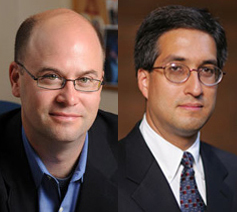
Today’s narrow Supreme Court decision that corporations may spend freely to support or oppose candidates for president and Congress drew reactions from two Notre Dame Law School faculty members.
According to Notre Dame Law School professor Richard W. Garnett, the court’s 5-4 decision in Citizens United v. Federal Election Commission, is “welcome and correct.”
“The notion that regulating ‘negative ads’ or ‘reducing money in politics’ could return us to an imagined ‘Golden Age’ of clean and civil politics is, at first, attractive,” Garnett said. “However, politics in a free society is necessarily messy, and often unedifying. The alternative, management by insiders and incumbents of the tone and terms of public debate, is worse.”
According to Garnett, “Justice Kennedy got it right: Our First Amendment is ‘premised on mistrust of government power,’ and is well understood to prohibit attempts by regulators, even high-minded ones, to disfavor certain subjects, viewpoints or speakers.
“Oprah Winfrey has a lot of money and influence—more than the Chamber of Commerce, perhaps—but her power to influence others certainly would not justify limiting her speech. It is true that insurance companies can shape views through their speech and spending, but so does The New York Times.”
Garnett said that today’s ruling will not end reasonable regulations that are carefully crafted to prevent election-related corruption, and he noted that it did not invalidate existing disclosure and disclaimer requirements. “It is one thing,” he said, “to regulate expression—to
reduce political speech—out of fear that it will ‘distort’ the public conversation. It is another thing to say that, as a general matter, people are entitled to know who is paying for the election-related messages they hear.”
Lloyd Hitoshi Mayer, associate professor of law in the Notre Dame Law School predicts consequences from the decision.
“This decision will further the shift in electoral power away from the political parties, which still face sharp limits on their ability to raise funds for elections, to 527s and other independent groups that now can receive unlimited amounts of corporate and union money,” Mayer said.
“That said,” Mayer added, “the decision does not mean we will suddenly see lots of election ads paid for directly by big corporations such as GE or Microsoft. Given that the disclosure provisions survived, such corporations will not want to risk alienating a large portion of their customers and shareholders. They will rather pay for such ads indirectly through increased contributions to nonprofit organizations such as the U.S. Chamber of Commerce and trade associations.
“Expect to see many more ads from such groups, and from labor unions and other nonprofit advocacy groups, in this year’s elections,” Mayer said.
Contact: Professor Garnett, 574-631-6981, rgarnett@nd.edu; Professor Mayer, 574-598-0740, lmayer@nd.edu